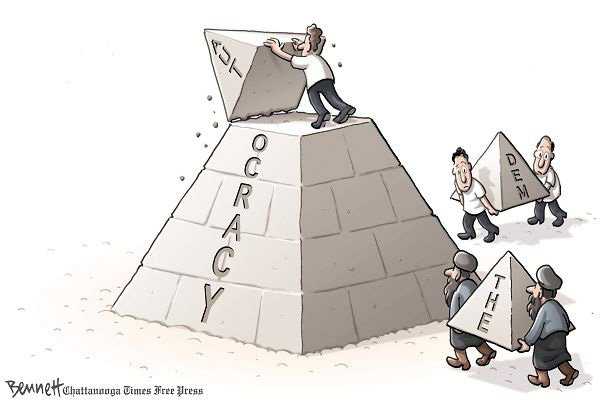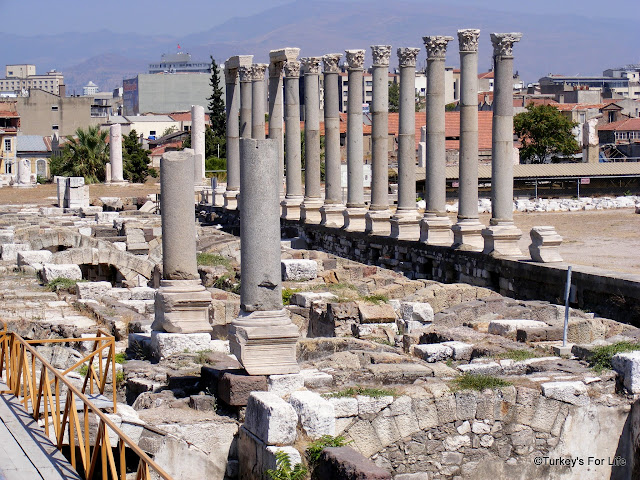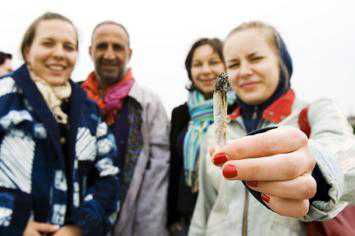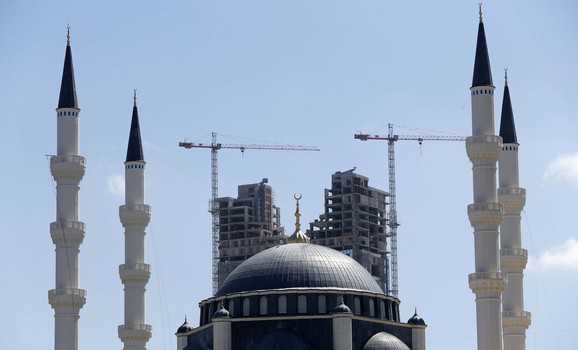New America Media, News Report, Frank Viviano, Posted: Sep 02, 2011
In 1995, the city of Gaziantep, on the southeastern edge of Turkey’s Anatolian plain, was under siege. Its crumbling medieval center was swamped with refugees from a civil war between insurgent Kurds and the Turkish Army that eventually left 40,000 dead and 3,000,000 people homeless. Along the borderlands with Syria and Iraq, smoke rose from rural Kurdish villages obliterated by F-15 strikes.
A New Look at Shariah Law
Frank Viviano
A central tenet of Islam is the conviction that the Koran, the Muslim book of revelation, is God’s final and direct word to humankind, as related to the Prophet Mohammed in 610 A.D. in what is now Saudi Arabia.
But the Koran is not the sole compendium of Islamic values. It is in an epochal project involving a second Islamic text, known as the “Hadith,” that Turkey’s bold reform movement may pave its most fruitful ground.
The Hadith is a digest of the conversations and deeds of Mohammed after the revelations of the Koran. It is the chief source of rules that inform Muslim life, including customs, social mores, dress codes and an estimated 90 percent of Shariah law.
For the past nine years, 80 eminent historians and theologians commissioned by Turkey’s Department of Religious Affairs have been working on a 21st-century revision of the Hadith. It is scheduled for publication by the end of 2011.
“We want to bring out the positive side of Islam — that promotes personal honor, human rights, justice, morality, women’s rights, respect for the other,” Professor Mehmet Gormez, vice-president of religious affairs and senior Hadith lecturer at Ankara University, recently told The Times of London.
The revision would eliminate such medieval aphorisms as, “the best of women are those who are like sheep,” and “Your prayer will be invalid if a donkey, black dog or a woman passes in front of you.”
Instead, it will emphasize other passages, often of pointed significance to the contemporary scene. “Religion is very easy and whoever overburdens himself in his religion will not be able to continue in that way. So you should not be extremists,” Mohammed cautions his followers in a key Hadith.
“God does not judge you according to your bodies and appearances,” the Prophet says, in a conversation that seems aimed straight across the centuries at controversies over matters of dress and sexuality in Saudi Arabia, Iran and Afghanistan. “He looks into your hearts and observes your deeds.”
Turkey’s religious authorities have also subsidized advanced theological training for 450 women, appointing them as senior imams (“vaizes”) empowered to explain the “original spirit of Islam” in rural communities.
“A revolution is taking place here,” according to Taha Akyol, a Turkish political commentator.
Nationwide, the economy was mired in triple-digit inflation and soaring joblessness, with a GDP of less than $116 billion, under $2,000 per person. Turkey in the 1990s epitomized a devastating crisis among Muslim-majority nations – a desperate spiral of poverty, violence and authoritarian rule.
Today, a decade after the September 11 terrorist attacks that turned much of the Islamic world into a chaotic battleground, Turkey has emerged as Islam’s most prominent icon of hope.
In 2011, it boasts the world’s 15th largest GDP, measuring $1.2 trillion – nearly $15,000 per person and rising by $125 billion annually. The Turkish economy now ranks ahead of such highly-developed nations as Australia and the Netherlands, and oil-giant Saudi Arabia. With a current growth rate of 11 percent, outstripping China’s and defying the effects of a global recession, it could surpass G-8 member Canada in the next few years.
More than 99 percent of Turkey’s 74 million citizens are Muslim.
Gaziantep, when I returned there on another assignment in 2010, had transformed itself into a city of manicured parks, architecturally stunning museums, carefully restored 10th century neighborhoods and 21st century shopping malls. High-rise residential suburbs had sprung from empty fields where army tanks were once marshaled. On a per capita basis, this city of 1.3 million is now the number one exporter and importer in the country.
The chief architect of Turkey’s miracle is the Justice and Development Party – popularly known by its Turkish initials, “AK” – an Islamic political group that took power in a landslide 2002 election.
Over the following decade, under Prime Minister Recep Tayyip Erdogan, the new government dramatically reformed the bureaucracy-ridden Turkish economy, setting off an unprecedented boom in business starts, jobs and exports. Ten years ago, notes Bloomberg analyst Ben Holland, Turkey struggled under a debt load that dwarfed Greece’s on the eve of the global financial crisis in 2009. By 2010 Turkey’s debt was down to 46 percent of GDP, compared with 143 percent percent for Greece.
Turkey in 2011 is the thriving proof that a Muslim majority, democracy and economic modernization are compatible – the new model that, in the eyes of many, political Islam has been waiting for.
The Old Model: Saudi Arabia
In 2003, thanks to the sponsorship of a Saudi official, I was able to participate in the haj, the pilgrimage to the Arabian Peninsula that is an obligation for Muslims but normally closed to others. Although I wasn’t permitted to enter Mecca, the epicenter of Islamic faith, I joined a vast throng silently marching to the Prophet’s Mosque in Medina, the site of Mohammed’s tomb and Islam’s second most important shrine.
During shared evening meals at another Medina mosque, I spoke with pilgrims from China, Algeria, Egypt, Nigeria, Malaysia, Indonesia and Uzbekistan – and also from France and Holland, home today to two of Western Europe’s largest Muslim communities.
The sense of peace and inner reflection, of profound tolerance and solidarity among far-flung people from every walk of life, was deeply moving. “This is what we see in our religion,” a young man from western China’s Yunnan Province said, “not suicide bombers or planes flying into sky-scrapers.”
Yet it was impossible to ignore the fact that Chinese and Uzbek women on the haj — few of whom wear more than a light scarf in their own countries, and then only during prayers — were obliged to cover themselves in the head-to-toe black abaya, required of all women by Saudi law, including millions of Christians, Hindus and Buddhists who work as domestics in the country.
None of those non-Muslims are allowed to honor their own religious beliefs while in Saudi Arabia, a country that bans the establishment of churches or temples.
It was also impossible to ignore the Mutaween, the 5,000-strong religious police force formally known as the Commission for the Promotion of Virtue and Prevention of Vice. The Mutaween stalk supermarkets, shopping malls, schools and apartment complexes in search of any breach of Wahabbism, the sternly fundamentalist brand of Islam favored by the ruling Saud family.
They can arrest and jail a woman with a single strand of hair exposed, along with unmarried couples – Saudi or foreign – who socialize in public, residents who are discovered with a bottle of beer or a Bible in their apartment, or anyone who observes “infidel superstitions” such as sending St. Valentine’s Day cards.
Indescribably wealthy as the source of the planet’s largest oil reserves, and respected as the home and protector of Islam’s most important holy sites, Saudi Arabia wields weight far beyond its own size (population 28 million) in an international community of believers that numbers 1.6 billion. One result is that political Islam — whether in the violent form practiced by Al Qaeda or the state theocracy of Iran – widely echoes the Saudi model of hectoring authoritarianism.
But in socio-economic terms, it is difficult to view Saudi Arabia as a functional model at all. Its resources are so vast and its distortions so extreme that virtually no country beyond the hyper-affluent oil states can really emulate it.
Saudi citizenship means free education, health care and housing – but often a life without gainful employment. According to the Saudi Labor Ministry, imported temporary workers account for a staggering 90 to 95 percent of private-sector jobs. It’s not much exaggeration to say that the only Saudis who actually work are those with the connections to acquire high administrative posts in the bureaucracy, or in enormous state enterprises tightly controlled by the Sauds and their retainers.
Ranks of young men on the streets of Riyadh, the capital, are visibly lost to boredom, in a land where movie theaters, clubs and mixed-gender socializing are illegal — and much of modern culture is only virtual, observed on the Internet or via satellite television broadcasts from uninhibited Beirut and Cairo. Frustrated and without clear purpose, they recall the kind of young man that the teenaged Osama bin Laden is said to have been, or the 15 Saudis among the 19 hijackers on September 11, 2001.
The establishment of an elected parliament with formal powers has been under discussion in Riyadh for two generations, but remains a vague distant goal.
As for women – who have played frontline roles in the mass protests of Iran in 2009 and the Arab Spring of 2011 – they are forbidden by law to drive in Saudi Arabia, and may not even be passengers in a car unless accompanied by a male member of their family.
The contrast with Turkey could not be more striking.
Faith Without Repression
At the outset of the Erdogan era, many secular-minded Turks warned that the AK party would eventually transform their country into another Saudi Arabia. But 10 years later, Istanbul reminds no one of Riyadh or the Mutaween.
The city’s main commercial thoroughfare, Istiklal Avenue, is a two-mile-long corridor of seething artistic and intellectual ferment, its surrounding streets and squares ringed with avant-garde theaters and cinemas, restaurants and nightclubs, art galleries and bookshops. By 2010, when the European Union named Istanbul the “European Capital of Culture” – despite the fact that Turkey is not an EU member-state – the district’s attractions were drawing up to 3 million people per day.
The dynamic street life of Istanbul, as well as Gaziantep and smaller urban centers across the country, shatters the notion that a Muslim nation must be repressive and uncompromising.
On the foreign policy front, the AK government has come closer than any government in the nation’s history to ending the Turks’ historic enmities with their Armenian, Greek and Arab neighbors.
In southeastern Anatolia, the expression of Kurdish culture has been legalized for the first time since the fall of the Ottoman Empire, permitting school courses, radio and TV broadcasts and books in the Kurdish language. After the bloody carnage of the civil war, tensions remain, and separatists from the Kurdistan Workers Party (PKK) still launch periodic assaults that bring targeted police or army reprisals.
But in the sprawling new suburbs of cities like Diyarbakir, the Kurds’ de facto cultural capital, “most young people prefer to speak Turkish these days, because they regard it as the language of modern life and opportunity,” says a 35-year-old Kurdish woman who once led militant protests.
Last month, in a gesture that remains unthinkable almost anywhere else in the Muslim bloc, Prime Minister Erdogan announced that Ankara will return or offer compensation for churches, synagogues, schools, hospitals and cemeteries that were confiscated by the state over the past 75 years.
“Times that a citizen of ours would be oppressed due to religion, ethnic origin or different way of life are over,” he said, speaking before representatives of more than 150 Christian and Jewish organizations.
Step-by-careful-step, the Erdogan administration – which won every national election after 2002 by huge margins, most recently last June – has broken the long reign of the Turkish Army as behind-the-scenes political powerbroker, in a world where dictatorial regimes rule most Muslim-majority states.
In the name of democracy, rather than religion, the expression of selected Muslim customs has been legalized, notably the right of devout women to wear light headscarves in public institutions if they choose. But today few observers speak of a hidden plan to impose theocracy.
The number of women in Turkey’s parliament increased by more than 50 percent in the 2011 national elections, to 78 seats.
“Secularism, one of the main principles of our republic, is a precondition for social peace as much as it is a liberating model for different lifestyles,” AK second-in-command Abdullah Gul insisted in his inauguration speech as president of Turkey in 2007.
Justice and Development, he says, is no different than the Christian Democratic parties that ruled Italy and Germany for most of the half century after World War Two. If religious values supply part of the AK identity, its outlook is resolutely centrist and modern.
Quietly, just months after September 11, it embarked on a controversial revision of the principal sources for Shariah law, the code that defines and regulates daily behavior for believers. The deliberate aim, say the project’s insiders, is to reconcile Islamic doctrine and Shariah law with the modern world. The final draft, due by the end of 2011, will be closely read by Muslims everywhere.
To the Wahabbist hardliners of Riyadh, the reforms proposed by Ankara look like heresy. But their fellow citizens overwhelmingly disagree. In 2002, according to a survey of Islamic world attitudes conducted annually by pollster James Zogby, a scant 20 percent of Saudis had a favorable view of Turkey. In 2011 the favorable rating reached 98 percent.





